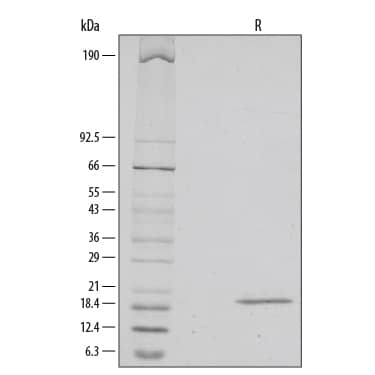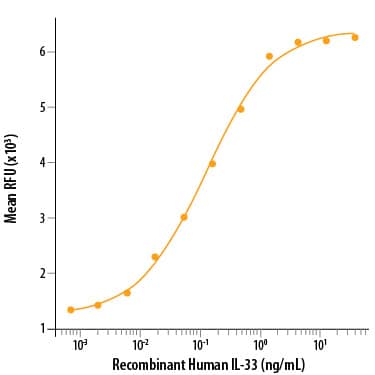Recombinant Human IL-33 Protein Best Seller
R&D Systems, part of Bio-Techne | Catalog # 3625-IL

Key Product Details
Product Specifications
Source
Ser112-Thr270
Purity
Endotoxin Level
N-terminal Sequence Analysis
Predicted Molecular Mass
Activity
The ED50 for this effect is 0.06-0.24 ng/mL.
Optimal dilutions should be determined by each laboratory for each application.
Reviewed Applications
Read 6 reviews rated 4.7 using 3625-IL in the following applications:
Scientific Data Images for Recombinant Human IL-33 Protein
Recombinant Human IL-33 Protein Bioactivity
Recombinant Human IL-33 (Catalog # 3625‑IL) stimulates cell proliferation of the D10.G4.1 mouse helper T cell line. The ED50 for this effect is 0.06-0.24 ng/mL.Recombinant Human IL-33 Protein SDS-PAGE
1 μg/lane of Recombinant Human IL-33 was resolved with SDS-PAGE under reducing (R) conditions and visualized by silver staining.Formulation, Preparation and Storage
Carrier Free
What does CF mean?CF stands for Carrier Free (CF). We typically add Bovine Serum Albumin (BSA) as a carrier protein to our recombinant proteins. Adding a carrier protein enhances protein stability, increases shelf-life, and allows the recombinant protein to be stored at a more dilute concentration. The carrier free version does not contain BSA.
What formulation is right for me?In general, we advise purchasing the recombinant protein with BSA for use in cell or tissue culture, or as an ELISA standard. In contrast, the carrier free protein is recommended for applications, in which the presence of BSA could interfere.
Carrier: 3625-IL
| Formulation | Lyophilized from a 0.2 μm filtered solution in PBS, EDTA and DTT with BSA as a carrier protein. |
| Reconstitution | Reconstitute at 10 μg/mL in sterile PBS containing at least 0.1% human or bovine serum albumin. |
| Shipping | The product is shipped at ambient temperature. Upon receipt, store it immediately at the temperature recommended below. |
| Stability & Storage | Use a manual defrost freezer and avoid repeated freeze-thaw cycles.
|
Carrier Free: 3625-IL/CF
| Formulation | Lyophilized from a 0.2 μm filtered solution in PBS, EDTA and DTT. |
| Reconstitution | Reconstitute at 100 μg/mL in sterile PBS. |
| Shipping | The product is shipped at ambient temperature. Upon receipt, store it immediately at the temperature recommended below. |
| Stability & Storage | Use a manual defrost freezer and avoid repeated freeze-thaw cycles.
|
Background: IL-33
IL-33, also known as NF-HEV and DVS 27, is a 30 kDa proinflammatory protein that may also regulate gene transcription (1‑3). DVS 27 was identifed as a gene that is upregulated in vasospastic cerebral arteries (1). NF‑HEV was described as a nuclear factor that is preferentially expressed in the endothelial cells of high endothelial venules relative to endothelial cells from other tissues (2). IL‑33 was identified based on sequence and structural homology with IL‑1 family cytokines (3). DVS 27, NF‑HEV, and IL‑33 share 100% amino acid sequence identity. IL‑33 is constitutively expressed in smooth muscle and airway epithelia. It is up-regulated in arterial smooth muscle, dermal fibroblasts, and keratinocytes following IL‑1 alpha or IL‑1 beta stimulation (1, 3). Similar to IL‑1, IL‑33 can be cleaved in vitro by caspase‑1, generating an N‑terminal fragment that is slightly shorter than the C‑terminal fragment (3, 4). The N‑terminal portion of full length IL‑33 contains a predicted bipartite nuclear localization sequence and a homeodomain‑like helix‑turn‑helix DNA binding domain. By immunofluorescence, full length IL‑33 localizes to the nucleus in HUVECs and transfectants (2). The C‑terminal fragment, corresponding to mature IL‑33, binds and triggers signaling through mast cell IL‑1 R4/ST2L, a longtime orphan receptor involved in the augmentation of Th2 cell responses (3, 5‑7). A ternary signaling complex is formed by the subsequent association of IL‑33 and ST2L with IL‑1R AcP (8). Stimulation of Th2 polarized lymphocytes with mature IL‑33 in vitro induces IL‑5 and IL‑13 secretion (3). In vivo administration of mature IL‑33 promotes increased production of IL‑5, IL‑13, IgE, and IgA, as well as splenomegaly and inflammatory infiltration of mucosal tissues (3). Full length and mature human IL‑33 share
52‑58% aa sequence identity with mouse and rat IL‑33. Human IL‑33 shares less than 20% aa sequence identity with other IL‑1 family proteins.
References
- Onda, H. et al. (1999) J. Cereb. Blood Flow Metab. 19:1279.
- Baekkevold, E.S. et al. (2003) Am. J. Pathol. 163:69.
- Schmitz, J. et al. (2005) Immunity 23:479.
- Black, R.A. et al. (1989) J. Biol. Chem. 264:5323.
- Xu, D. et al. (1998) J. Exp. Med. 187:787.
- Lohning, M. et al. (1998) Proc. Natl. Acad. Sci. 95:6930.
- Dinarello, C.A. (2005) Immunity 23:461.
- Chackerian, A.A. et al. (2007) J. Immunol. 179:2551.
Long Name
Alternate Names
Gene Symbol
UniProt
Additional IL-33 Products
Product Documents for Recombinant Human IL-33 Protein
Product Specific Notices for Recombinant Human IL-33 Protein
For research use only

